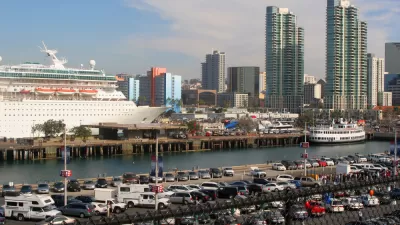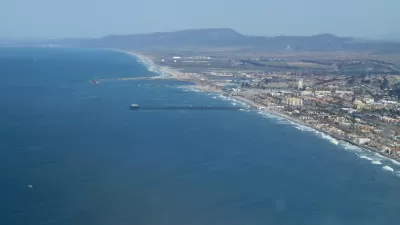One of the most powerful agents of environmental protection in the state of California is faced with what some believe is an existential threat.
Steve Blank pens an op-ed to raise awareness of dramatic changes at the California Coastal Commission. According to Blank, "for as long as the commission has existed, real estate developers and their lobbyists have wanted to weaken it, or dispatch it altogether. Now those efforts have reached a critical point. Lobbyists for land developers have persuaded commissioners to fire Charles Lester, the executive director of the Coastal Commission's staff."
Tony Barboza broke the news about the shakeup at the Coastal Commission, which is tasked with overseeing development along the California Coast according to powers established by the California Coastal Act of 1976.
Blank begins by celebrating the state's coast, crediting the work of the Coastal Commission in protecting "pristine coastline" and "unspoiled beaches" that are "the envy of the world." Los Angeles Times columnist Steve Lopez wrote similar sentiments recently in reaction to the news of the move to fire Lester.
Blank's op-ed offers perspective on the function of the Coastal Commission by comparing it to a local zoning board:
The Coastal Commission is the zoning board for the whole California coast. For example, there's a proposal to build 1,100 houses in the coastal zone in Southern California before the commission right now. At $1.5 million for each house near the ocean, that's nearly $2 billion at play. Huge sums are at stake for developers, who regularly challenge coastal staff rulings, donate heavily to politicians, and hire teams of lobbyists to persuade commissioners to make an exception for their individual project.
Blank offers more perspective by noting the irony of the current controversy: "The cabal of commissioners pushing to remove Lester are appointees of Gov. Jerry Brown — the same governor who signed the Coastal Act into law 40 years ago."
FULL STORY: The coastline belongs to all Californians—but maybe not for long

Planetizen Federal Action Tracker
A weekly monitor of how Trump’s orders and actions are impacting planners and planning in America.

Congressman Proposes Bill to Rename DC Metro “Trump Train”
The Make Autorail Great Again Act would withhold federal funding to the system until the Washington Metropolitan Area Transit Authority (WMATA), rebrands as the Washington Metropolitan Authority for Greater Access (WMAGA).

DARTSpace Platform Streamlines Dallas TOD Application Process
The Dallas transit agency hopes a shorter permitting timeline will boost transit-oriented development around rail stations.

Supreme Court Ruling in Pipeline Case Guts Federal Environmental Law
The decision limits the scope of a federal law that mandates extensive environmental impact reviews of energy, infrastructure, and transportation projects.

Texas State Bills to Defund Dallas Transit Die
DART would have seen a 30% service cut, $230M annual losses had the bills survived.

Bikeshare for the Win: Team Pedals to London Cricket Match, Beats Rivals Stuck in Traffic
While their opponents sat in gridlock, England's national cricket team hopped Lime bikes, riding to a 3-0 victory.
Urban Design for Planners 1: Software Tools
This six-course series explores essential urban design concepts using open source software and equips planners with the tools they need to participate fully in the urban design process.
Planning for Universal Design
Learn the tools for implementing Universal Design in planning regulations.
Roanoke Valley-Alleghany Regional Commission
City of Mt Shasta
City of Camden Redevelopment Agency
City of Astoria
Transportation Research & Education Center (TREC) at Portland State University
US High Speed Rail Association
City of Camden Redevelopment Agency
Municipality of Princeton (NJ)





























